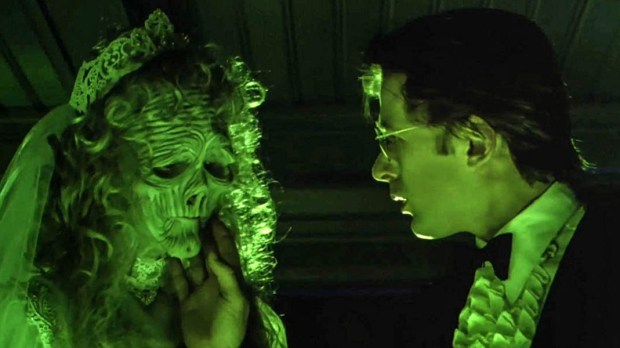We’ve already noted Hollywood’s history of envisioning what Hell might be like. Well, never ones to let good subject matter go to waste, filmmakers have also from time to time speculated on the concept of Purgatory. The problem is, given the general state of confusion outside of Catholic circles (and sometimes within) about what exactly Purgatory is, efforts to depict that particular state of being have been very hit or miss.
It really shouldn’t be that difficult. As St. Pope John Paul II explained in a 1999 General Audience, “what is destined for God must be perfect … [therefore] the need for integrity obviously becomes necessary after death, for entering into perfect and complete communion with God. Those who do not possess this integrity must undergo purification.” Basically, some folks have to make a pit stop on their way to Heaven to get cleaned up a little first, and the Church refers to that pit stop as Purgatory. Easy enough, right? And yet, more often than not, Hollywood tends to get Purgatory dead wrong. Let’s take a look at some of their more interesting missteps. (Yes, there will be spoilers.)
Purgatory (1999)
When outlaws on the lam ride into the small frontier town of Refuge, they’re surprised to find the likes of Doc Holliday and Wild Bill Hickok running the place. It turns out Refuge is where dead gunslingers are sent to see if they can live violence-free for 10 years. If successful, they get to mosey on into Heaven. If not, well, there’s always the other place. Unfortunately, an angry posse shows up guns ablaze and the citizens of Refuge must decide whether to defend themselves and risk Hell or suffer abuse and earn Heaven. With such a setup, Purgatory (the film) falls into the common error of viewing Purgatory (the experience) as a second chance for Heaven after death, rather than as a way station for those who have already made the cut. Bad theology aside, though, it’s still a pretty entertaining little western.
Beetlejuice (1988)
After the Maitlands die in a freak car accident, they are consigned by the powers that be to remain as ghosts in their old house for the next 125 years. Annoyed by the home’s new owners, but not scary enough to chase the interlopers off themselves, the Maitlands call on the mischievous spirit Beetlejuice to help purge their home of the living. Hilarity ensues. Obviously, Beetlejuice should not be taken as any kind of primer on the afterlife. Even so, it does manage to touch on the idea that some good people don’t immediately get to claim their final reward. It also gets points for noting that the waiting experience could be unpleasant. You see, in Beetlejuice, those guilty of taking their own lives must spend their time in “Purgatory” working as civil servants. Yikes.
Gabriel (2007)
Now, if you really want to watch something that gets Purgatory completely wrong, Gabriel is the film for you. In this movie’s universe, Purgatory is a grimy film-noir nightmare city full of trapped souls over which Heaven and Hell have fought for control since the beginning of time. With Hell having recently gained the upper hand, the archangel Gabriel comes to town to find out what has gone wrong. Trust me, it would take too long to explain everything stupid about this movie. Suffice to say any film that has angels taking up prostitution to make ends meet has abandoned any connection to actual theology. On top of that, the movie just isn’t that good, period.
Groundhog Day (1993)
Okay, this one is something of a cheat as its main character doesn’t actually die. Regardless, it’s nigh impossible to watch this classic Bill Murray comedy without giving Purgatory a thought or two. When a disgruntled weatherman is forced to travel to Punxsutawney, Pennsylvania for the town’s annual Groundhog Day celebration, he finds himself mysteriously forced to relive the same day over and over again, often to hilarious results. It is only after he admits to the true state of his soul and cleanses himself of his boorish, self-centered ways that our perturbed protagonist is allowed to move on with his life. Sure, it’s not exactly Purgatory, but the general idea is there. Of course, we probably shouldn’t count on the real Purgatory being quite so funny.
Jacob’s Ladder (1990)
Too many horror movies to name have as their big twist the reveal that their characters were in Purgatory all along. However, none do it so effectively as Jacob’s Ladder. The story follows a hapless postal clerk who is not only tormented by memories of the death of his son, but also by flashbacks to a barely remembered incident in Vietnam. As the mystery of what happened to him during the war unravels, our hero begins to experience visions of demons who seem intent on tearing his soul apart. Or are they really trying to accomplish something else? What helps elevate Jacob’s Ladder above its Purgatory-based peers is that it delves a bit deeper into the subject matter than most other movies do. The film acknowledges that it’s not just petty sins that can hold a soul back, but also any unhealthy attachment to the good things in this life. Those too must be released before one can move on into eternal light.
And that’s the ultimate goal, isn’t it? So, if lingering traces of sin require some of us to pass through Purgatory on the way to Heaven, well, that’s fine, even if the experience does somehow turn out to be like one of Hollywood’s bizarre takes on the idea. Whatever, it’s still better than the alternative.

